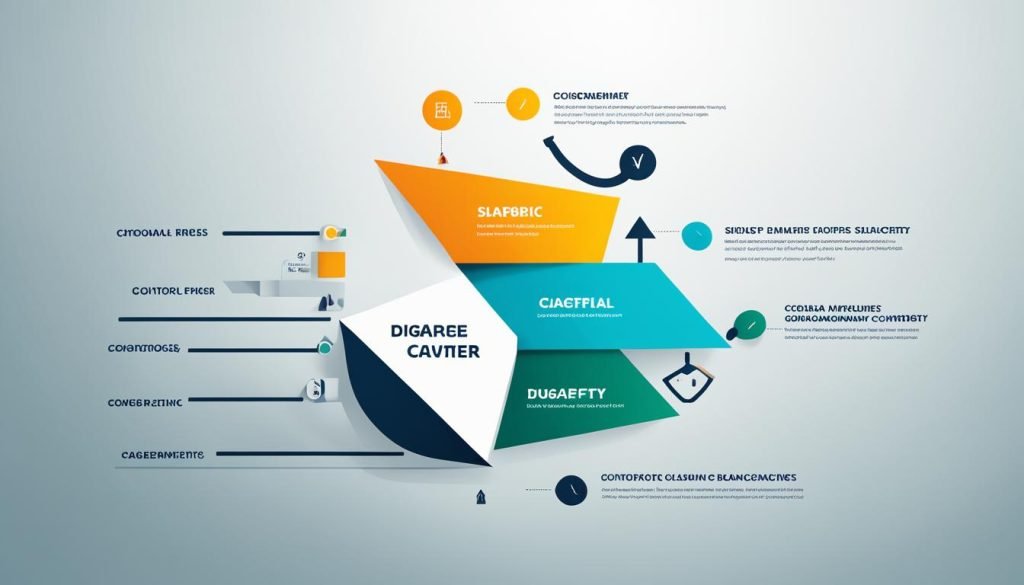Corporate governance best practices are key for every organization. This includes big and small businesses, public and private firms, and even nonprofits. Using these practices helps companies do better, earn trust from those involved, and stick around for the long haul.
This strategy covers many parts of how a company runs, such as where it’s headed, handling risks, and being ethical. It’s all about being open, telling people what’s going on, and making sure everyone involved is part of the conversation. It also means including people from different backgrounds, focusing on keeping things going well for the planet, and keeping information safe.
Following these best practices helps with making smart plans, managing risks, and having a team that wants to do the right thing. They keep everyone in the company responsible, encourage good leadership, and push for ethical actions all the time.
Being open and talking about what a company is doing is really important in corporate governance. This way, everyone who’s interested knows what’s up, including how the money’s looking and what could go wrong. Talking to the people who care about the company helps earn their trust, making sure everyone’s interests are taken into account.
In today’s fast-changing world of business, it’s super important for companies to welcome different ideas and people into their decision-making teams. Being green and protecting information are also a must to keep everyone happy and do the right thing.
Key Takeaways:
- Corporate governance best practices are crucial for all types of organizations.
- Implementing these practices can lead to improved performance, enhanced stakeholder trust, and long-term sustainability.
- Corporate governance emphasizes strategic planning, effective risk management, and ethical conduct.
- Transparency, disclosure, and stakeholder engagement play a key role in corporate governance.
- Incorporating diversity, inclusion, sustainability practices, and cybersecurity measures are critical for organizational success.
Board Composition
Building a strong board is key for corporate success. A mix of people brings new ideas and skills to the boardroom. This leads to better decisions and plans.
Focusing on adding fresh faces is vital. Regularly updating how new members are picked keeps the board lively. It makes sure everyone involved brings something different to the team.
Being clear in how you pick people matters a lot. Giving out information about the company’s goals and what’s expected helps candidates figure out if they’re a good fit. It makes the process fair for everyone.
Letting candidates know what they’re signing up for is essential. This way, they understand what’s expected of them. It’s good for both the candidates and the organization. It avoids later problems.
Diversity is not just a trend; it’s crucial. Boards should include people of different genders, ages, and cultures. This mix is powerful for making choices that benefit everyone involved.
Qualifications and Independence
Having the right skills is just as essential as diversity. Ideal members bring leadership and the ability to make big decisions. This experience is a huge plus.
Knowing the industry well is a must. It provides insights that can help the business thrive. These skills are key for a successful board.
Independent thinkers are very important. They keep the board focused on doing what’s best for the company. They aren’t swayed by personal gain.
Mixing skills, independence, and varied backgrounds boosts the board’s strength. It leads to better management and more success for the company.
Example Board Composition Table:
| Board Member | Skills and Expertise | Diversity Attributes | Independence |
|---|---|---|---|
| James Anderson | Financial Management, Risk Assessment | Gender Diversity | Independent |
| Michelle Chen | Marketing, Consumer Behavior | Ethnic Diversity | Independent |
| David Johnson | Supply Chain Management, Operations | Age Diversity | Dependent |
| Lisa Rodriguez | Technology, Cybersecurity | Unique Background | Independent |
Executive Compensation
Creating a just and fitting executive compensation plan is key in good corporate governance. It helps boards assure accountability and transparency while deciding what top leaders earn.
This starts by clearly defining what is expected from executives and what their jobs entail. This way, a company can assess how well these leaders do and link their pay to their achievements and goals.
To protect everyone involved and maintain high standards of ethics and integrity, rules about executive pay must be set. These rules should also cover how to handle situations where interests might conflict and how to make smart choices about what executives are paid.
Additionally, companies should have clear rules on how they do business and what they expect from their employees. These rules help encourage accountability and foster a culture that champions acting the right way and paying fairly.
“Tying executive pay to the company’s aims and long-standing success is crucial for ethical reasons. It’s also a strong incentive for leaders to push for lasting results and put the company’s future first.” – John Johnson, CEO of XYZ Corporation
Getting executive compensation right can boost openness in a company, build trust with those involved, and shape a culture of responsibility. All of which helps a company last and do well over time.
| Advantages | Disadvantages |
|---|---|
| 1. Attracts top talent | 1. Potential for excessive pay |
| 2. Motivates performance | 2. Perceived lack of fairness |
| 3. Aligns with organizational goals | 3. Public scrutiny and negative perception |
| 4. Retains key executives | 4. Diverts resources from other areas |
Risk Management
Risk management is crucial for business success. Boards play a big part by identifying and assessing risks. They set the company’s risk limits and choose the best strategies to manage them.
Monitoring is essential in risk management. Boards need to keep an eye on how risks are being handled. This includes checking on internal controls and following the law closely.
To make risk management stronger, boards should:
- Stay updated on relevant laws and regulations.
- Implement appropriate controls, resources, and monitoring systems.
- Encourage a risk-aware culture throughout the organization.
Being active and well-informed means boards can protect their companies. This helps build trust and keeps the organization going strong for the long haul.
“Risk management needs focus and oversight from the board. It’s not enough to just set up controls. The board must check if these measures are working in line with the company’s goals.”
– Jane Andrews, Chief Risk Officer, ABC Corporation
Embedding Risk Management into the Organization
Risk management goes hand in hand with overall business operations. To work well, it must be part of all decision-making processes and planning.
- Ensure that risk management is incorporated into strategic planning and decision-making processes.
- Encourage open communication and information sharing among different departments and levels of the organization.
- Promote a culture of accountability and continuous improvement.
By weaving risk management throughout their organizations, boards make a safer, more successful place. This approach helps dodge risks and spot chances for growth.

Benefits of Effective Risk Management
| Benefits | Description |
|---|---|
| Enhanced Decision Making | Risk management allows for smarter decisions by highlighting risks and their impacts. |
| Improved Financial Performance | It safeguards finances and cuts down on losses. |
| Stakeholder Confidence | It builds trust with investors, customers, and employees. |
| Compliance and Legal Protection | It ensures that laws and standards are met, protecting the organization’s reputation and bottom line. |
With the right risk management, boards can guide their organizations successfully. This is especially important in a world where change is constant.
Stakeholder Engagement and Transparency
Engaging with stakeholders and being open and clear are key parts of managing a company well. By talking openly with investors, staff, clients, and other important people, companies can build trust and stay responsible. It’s vital for companies to think about everyone’s needs and share financial info and news on time and accurately.
When it comes to checks on money and audits, companies need to have good ways for people to report problems. This is done through a system where workers and others can tell if they see something bad happening. Having such programs not only helps find bad things but also promotes being good, honest, and following the law within the company.
Company boards should stress how important it is to be clear and answerable in all they do. This means speaking freely, giving updates often, and really talking with those who care. Making stakeholder connection a top priority helps ensure everyone’s needs are met. This leads to better management and the company growing in a good way for a long time.







